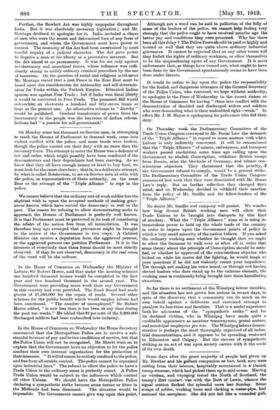Further, the Rowlett Act was highly unpopular throughout India. But
it was absolutely necessary legislation ; and Mr. Montagu declined to apologize for it. India included a clique of men who were the secret and determined foes of any form of government, and whom the Government must have power to control The necessity of the Aot had been ascertained by most careful inquiry of a judicial character. The Act gave power to deprive a man of his liberty as a preventive measure. But the Act aimed at no permanency. It was for use only against revolutionary and anarchical forces, whose influence was suffi- ciently strong to nullify ordinary criminal procedure by the use of terrorism. On the question of racial and religious settlement Mr. Montagu stated that a just Peace in the Near East must be based upon due consideration for nationality and self-determin- ation for Turks within the Turkish Empire. Educated Indian opinion was against Free Trade ; but if India won fiscal liberty it would be converted to Free Trade. The promised Bill would enfranchise an electorate a hundred and fifty-seven times as large as the present one. An alternative scheme to " diamhy " would be published. Gradual transference of power from the bureaucracy to the people was the keystone of Indian reform. Indians had " a passion for self-government."


































 Previous page
Previous page